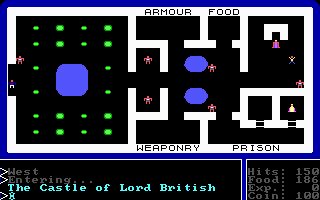The Ultima series, created by Richard Garriott (known in-game as Lord British), stands as one of the most influential and enduring RPG franchises in gaming history. The saga began humbly with Akalabeth: World of Doom (1979), a simple dungeon crawler that Garriott programmed as a teenager and sold in plastic bags at a local computer store. This primitive yet innovative game caught the attention of California Pacific Computer Company, leading to the birth of what would become a legendary series.
In 1981, Ultima I: The First Age of Darkness, or simply Ultima, established the foundation of Garriott's fantasy universe, introducing the world of Sosaria and the evil wizard Mondain. While graphically simple, it featured an ambitious scope that combined overworld exploration with dungeon crawling, setting the template for future installments.
The series truly found its identity with Ultima IV: Quest of the Avatar (1985), a revolutionary entry that abandoned the traditional "defeat the evil overlord" narrative in favor of a moral journey toward spiritual enlightenment. Players had to embody eight virtues - Honesty, Compassion, Valor, Justice, Honor, Spirituality, Humility, and Sacrifice - creating the first RPG focused on ethical character development rather than mere power accumulation.
Ultima V: Warriors of Destiny (1988) and Ultima VI: The False Prophet (1990) continued exploring moral complexity, while Ultima VII: The Black Gate (1992) represented the series' creative peak with its living, breathing world and sophisticated storytelling. The game's detailed simulation allowed players to bake bread, play musical instruments, and engage in countless activities that made Britannia feel genuinely alive.
Ultima Underworld: The Stygian Abyss (1992) pioneered true 3D dungeon exploration, while Ultima VII: Serpent Isle (1993) delivered an epic conclusion to the Guardian storyline. However, Ultima VIII: Pagan (1994) marked a controversial departure, abandoning party-based gameplay and the series' moral foundations in favor of action-oriented mechanics.
Throughout its evolution, the Ultima series consistently pushed technological and narrative boundaries, influencing countless RPGs with its emphasis on moral choice, world simulation, and player agency. Garriott's vision of interactive storytelling and ethical gameplay created a template that continues to inspire game developers today.













